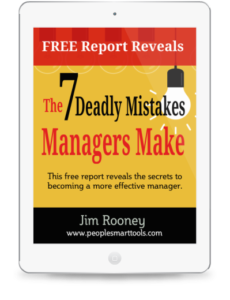Q. What is micromanagement?
A. It is excessive involvement by a manager with an employee in regards to their performance. In short, it is imposing work standards and behavior expectations that meet the personal needs of the manager, not the employee. It is to control a person or a situation by paying extreme attention to small details. The manager has good intentions to assist the employee fulfill their duties, but the employee feels disempowered and not trusted to complete work properly. Productivity falls drastically.
Q. What is the root problem when a manager feels like he has to micromanage an employee?
A. Many times the person selected for the job is not a good fit. At the time of the appointment to the job, little or no research was done to determine employee suitability for the demands of the position. When selecting a person for a job, often the top candidate is selected in regards to their experience, education, background check, and interviews (subjective means). When subjective and objective means (assessment of behaviors, values and personal skills) are used to evaluate candidates, the success rate is higher.
Using only subjective means (resumes, interviews, background checks) provides a mere 17% success rate in most industries. A Harvard University study reports that 80% of employee turnover can be blamed on mistakes made during the employee selection process.
Another cause is the employee has a bigger vision than the manager. Collaboration will tend to empower the employee. The best outcome happens when work activities are planned together.
Q. What are the predictable results and costs of employees that are micromanaged?
A. Micromanaged employees become disengaged, contributing very little to the success of their assignments. Disengaged employees tend to drag down other employees and customers. According to the book, “I Quit but Forgot to Tell You” by Terri Kabachnick, the annual cost of disengaged employees to employers in the U.S. is a staggering 250 billion dollars annually! How much is disengagement costing your organization?
If an employee is disengaged, they need to be trained appropriately, reassigned, or let go. It is hard to win back the heart and attitude of a disengaged employee, but mentoring/coaching might help. Learn more about mentoring in the questions below.
Q. What is mentoring?
A. Mentoring is a relationship in which a more experienced or more knowledgeable person helps a less experienced or less knowledgeable person acquire specific skills, attitudes and techniques that increases their value to their employer. The mentor shares personal experiences with the mentee. The mentee test drives the techniques and reports how it worked. The mentor helps them refine the concepts so it works with their personality.
Q. How is mentoring different than coaching?
A. Mentoring passes along experience. Coaches ask questions, listen closely and provide information that helps the other person gain a perspective that is beneficial. Coaches are about perspective; mentors are about teaching their experiences.
Q. Which is better, mentoring or coaching?
A. They are frequently used together. However, without training in the art of questioning and perspective building, a person will not be a very good coach.
Q. What are the five attributes of an effective mentor and/or coach?
1. You must believe that you have the skills and attitude to be effective. Mentoring on subjects that you are not proficient in is to help someone learn average information. Coaches must resist the urge to insert their own personal beliefs and help the other person discover new ways of perceiving the elements (effective principles) of their work environment.
2. Realize that it takes time for people to improve. Repeating the same information in new and innovative ways helps new skills emerge.
3. Confidentiality builds trust. The more vulnerable a person is in explaining their situation, the more they can be helped. They reveal more as trust increases. Trust is linked to confidentiality.
4. Ask the person how they like to receive encouragement. Listen closely and strive to meet their encouragement needs. Everyone needs encouragement. Some need a little, some need a lot. Be genuine in expressing praise as their skill improvement evolves.
5. Take time to get to know the person and build camaraderie and relationship. Remember the acronym FORD. Learn about their Family, Occupation, Recreation and Dreams. It is valuable to know their temperament and motivational needs. This is accomplished through assessments.
When the person feels that they are understood as a human, they become better students and improve more quickly.
Everyone can benefit from having a mentor/coach. I have two mentor/coaches. Being coached has allowed me to accelerate my career and gain information and skill that I would never have gotten otherwise.
Mentors and coaches are all around you. All you have to do is to have a desire to improve and ask someone you admire for help. Offer to take them to lunch and pick their brain on their expertise. It is very hard for anyone to refuse this invitation. Ask and it shall be given to you.



